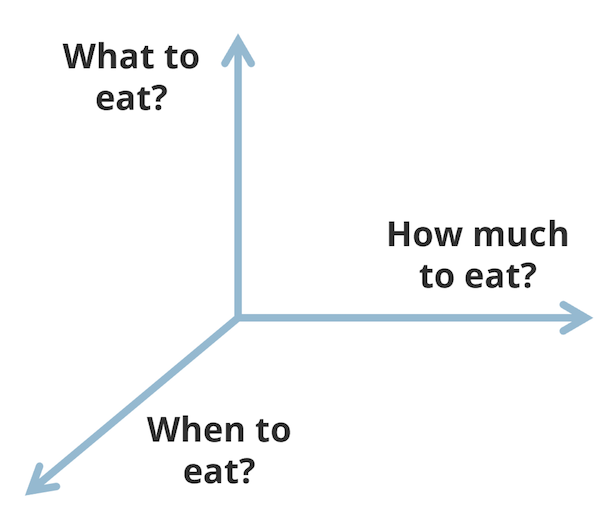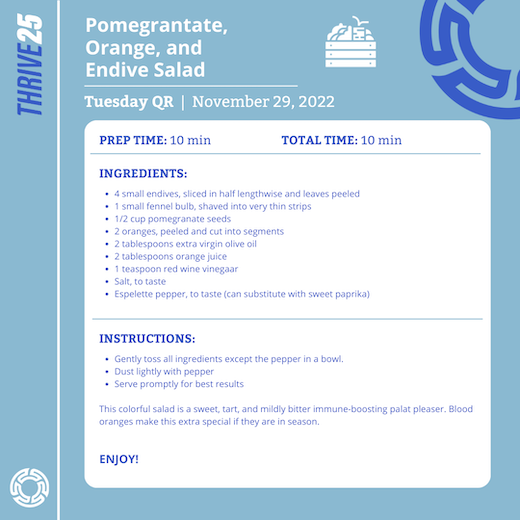Issue #74: Benefits of Fasting
Good morning. It’s Tuesday, November 29th. Today is Giving Tuesday. You can double the impact of your donation with most charities. Check out one of our favorites - World Central Kitchen!
“I fast for greater physical and mental efficiency.”
From the Lab: Fasting Stops Burnout
Take Action: Identify Your Reasons for Fasting
Speed Read: Caffeine for Your Face
Tuesday QR: Pomegranate, Orange and Endive Salad
Bucket List: Potala Palace
From the Lab
For those of you that started with us, we talked "What to eat" way back in Issue #2. Turns out that "how much" and "when" might be just as important.
It's easy to assume that intermittent fasting is just the next diet craze. And it's true that for many years most studies were only conducted on mice. But there's since been over 100 peer-reviewed papers on human studies that tell us what ancient thinkers have already told us (see quote above) - we probably shouldn't be eating all the time.*
So what's real and what's not yet known about fasting?
It seems pretty well established that fasting will lower your blood glucose levels and insulin resistance. Why is this important?
To put it simply - sugar (glucose) is the energy for life. But when we eat too much sugar or we eat sugar all the time, then it turns into something else - fat (literally).
Imagine you take on an important work project. You give it everything you've got - putting in nights/weekends for a few months. The project ends, but before you can catch your breath the next project is already stacked on your desk with an even more demanding schedule. It never ends - the projects just keep coming and coming.
You never get to take a break - your office is a disaster and your brain/body is completely burned out. Not from the work itself, but from the quantity of work. It was too much.
This simplified analogy may not be sufficient for medical textbooks, but it sums up the idea that we need time to do other work (burn fat, not sugar), keep our office organized (clean our cells), and not get burned out (crush our mitochondria) - otherwise there's no way we can thrive.
So fasting is that break.
By switching from eating 14-16 hrs/day to eating within a 6-10 hr window, we give our bodies a chance to regenerate and clean itself up (autophagy).
Related to this - over time fasting will help us become metabolically flexible. This basically means that we'll be able to burn fat (ketones) like we burn sugar. As a quick aside to the keto crowd - ketones aren't as efficient as glucose as a fuel source, but being able to use both sources is essential.
A few other potential benefits - better liver health, alignment with circadian rhythm, and inhibits mTOR.
*Satchidananda Panda, Salk Institute, has become the recognized leader in fasting research - read more of his work here.
Take Action
Why would you try intermittent fasting?
Thrive25 Partner Spotlight
Still feeling the affects of all that food this weekend? That's why we've partnered with Seed Health.
Their DS-01™ Daily Synbiotic includes 24 scientifically validated probiotic strains with a patented, non-fermenting prebiotic. This breakthrough formulation not only supports gut health, but also heart and skin health.
Go to Seed Health and check out their DS-01™ for adults and PDS-08™ Pediatric Daily Synbiotic for kids ages 3-17. ALL Thrive25 readers get 20% off their first month of DS-01™ Daily Synbiotic. Just use code THR25 at checkout!
Speed Read
Health & Longevity in the News
Caffeine for Your Face?: When we found out it's a stimulant - we invented ways to digest it. But rubbing coffee beans on your face? Skincare products are increasingly showing up with caffeine as an ingredient. So does it refresh tired-looking eyes? There’s only been one study, conducted by P&G (yes, they make these products). The results - don’t believe the hype. The price is higher, but the eyes look the same. (Big Think)
Insights for Endurance Sports: Jennifer Sygo, dietitian for Canada’s track and field and gymnastics teams, and the Toronto Raptors, shares insights on optimizing performance through nutrition for endurance athletes. 1) strategically increase your carbs, 2) watch your portion of veggies, 3) cleanse your colon, and 4) increase your iron intake. (Outside)
Exercise Snacks: Just 10-min per day can improve heart health and lower blood pressure. Even vigorous exercise for 1-3 min, can be helpful. Compared to 30-min workouts, these short bursts make it pretty hard to say no to a workout. It’s why we’ve designed our workouts to be 5-10 min. And when you have more time - treat them as stations and stack them. (WSJ)
Tuesday QR (Quick Recipe)
Winter means citrus - blood oranges are just now coming into season so take advantage with this awesome salad that meets the criteria for health & longevity from Dr. Steven Gundry.
Bucket List
Currently focused on fasting, and coming off a week on meditation - we thought we'd highlight a sacred palace in Tibet. Potala Palace was the winter palace to the Dalai Lama from 1649-1959. 10 Dalai Lamas lived there until the current, the 14th, was forced into exile in 1959. Since, the palace has been a museum with countless murals, intricate carpets, Buddhist scriptures and the world's longest scroll of Tibetan calligraphy (676 ft).
The Potala is a tribute to Buddhism, located on a mountaintop in the Tibetan capital, Lhasa, or "place of gods." At 12,000 ft above sea level, the 13-story climb to the top is no joke!
Lonely Planet
Thanks for joining us today!
Check out the latest workout videos on our YouTube channel
Got feedback? Tell us what you think at team@thrive25.com
Want this direct to your inbox? Sign up here
Why Thrive25
We’re 40-something dads that felt our bodies and minds start to slow down and we’re not ready for that. We found too much information on every subject. So we started Thrive25 to transform what we’ve learned into something useful for the rest of us to spend just 3-5 min a day to optimize our health & longevity.
This newsletter is for you and we truly value your feedback. Never hesitate to reach out to us at team@thrive25.com.
To health!
Sign up for free:
The information in this newsletter is for informational purposes only and may not be appropriate or applicable based on your individual circumstances. Thrive25 Labs LLC does not provide medical, professional, or licensed advice. Please connect with your healthcare professional for medical advice specific to your health needs.











